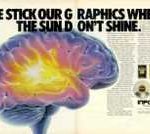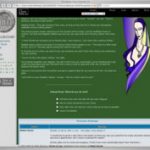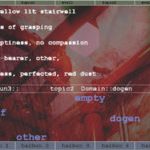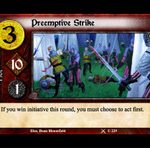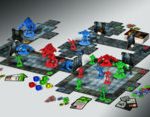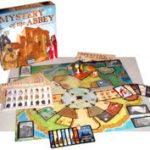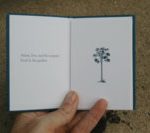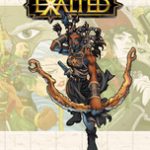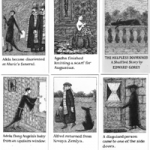2008
Jeremy Douglass evaluates Shade within the history of interactive fiction, and considers how light is represented in the code structure of scene descriptions, arguing that "[w]ithout vision there is no agency."
Carl McKinney argues that Jeremy Douglass's analysis of Shade suggests a presence/absence dynamic useful for understanding interactive fiction in general.
Mark Keavney describes his process in composing a story in which the readers voted on plot points as he was writing, resulting in a truly interactive fiction - a narrative in which, as Keavney puts it, "[n]either the players nor I owned the story completely."
Jeff Tidball contends that the Second Person collection makes too much of the narrative vs. play debate, and pays attention to the mechanics of narrative and play over their affective capabilities.
Jan Van Looy criticizes Erik Mona's history of Dungeons & Dragons as overly descriptive, and Van Looy critiques the game's quantification of the qualitative, i.e., personal characteristics and magic - which were hitherto considered unquantifiable.
Jordan Mechner explains how the team developing of Prince of Persia: The Sands of Time incorporated a number of cinematic techniques such as flashback and voice over (which do not usually figure into video games) while also working within the practical restrictions of a commercial production schedule.
Michael Mateas and Andrew Stern argue that new media practitioners and scholars should be literate in the code that underlies their objects of creation and study. To this end, they explain how they structured the code of their computer-based interactive drama Façade, which capitalizes on the procedural nature of computers to create a forum for participatory drama that negotiates players' local and global agency within the game world.
Robert Zubek describes how his program takes advantage of the tropes of breakup conversations. These generic norms allow The Breakup Conversation to assess players' textual entries categorically rather than semantically and thereby convincingly simulates an IM-based interaction.
Chris Crawford walks through Deikto, an interactive storytelling language that "reduce[s] artistic fundamentals to even smaller fundamentals, those of the computer: addition, subtraction, multiplication, and division."
D. Fox Harrell considers what is computational about composition, and describes the GRIOT system for generating literary texts.
Lee Sheldon describes his playable adaptation of Agatha Christie's And Then There Were None, which relies on his invention of a "suspicion meter" to quantify and track the player's interaction with - and assessments of - NPCs (non-player characters).
The electronic release of Second Person starts with a number of essays on tabletop role-playing. Most of these consider the entanglement of play and narrative in a variety of game systems, from the highly controlled to the largely open-ended.
Eric Lang (with Pat Harrigan) explains the advantages writers have in crafting adaptations of literary franchises into collectible card games. Lang maintains that, while attempting to remain true to the original, when turning narratives into games, one must "respect the medium."
Kevin Wilson describes his methodology of boiling a franchise down to its core elements and weighing the differences among media when translating games from medium to medium.
Bruno Faidutti begins with the controversial premise that "[e]very game tells a story," in his description of how he uses literary techniques to enhance gameplay - even in non-RPG systems such as board games, which don't traditionally include a story.
Jeff Bursey argues for a coherent, if unlikely, set of predecessors for William T. Vollmann: Aleksandr Solzhenitsyn, Blaise Cendrars, and John Cowper Powys. In the process of tracing this genealogy, Bursey defends Vollmann against critics who attack his alleged objectification of his subjects - prostitutes, the poor, and victims of violence.
Eric Zimmerman describes his interactive paper book as "an inverted exquisite corpse," and although a digital version of the book would be easy to produce, he argues that an electronic edition would not produce as meaningful an experience as the printed volume.
Kim Newman describes various methods of approaching his choose-your-own-adventure-style novel, which can be read or played because, like a role-playing game, "you are at once a reader and the main character."
Using Exalted as her text, Rebecca Borgstrom begins with the premises that every role-playing game requires a setting, and that to establish a fictional world players work within a mutually agreed upon structure to construct meaning.
James Wallis uses genre as the fulcrum for balancing game rules and narrative structure in story-telling games, which he differentiates from RPGs through their emphasis on the creation of narrative over character development.
